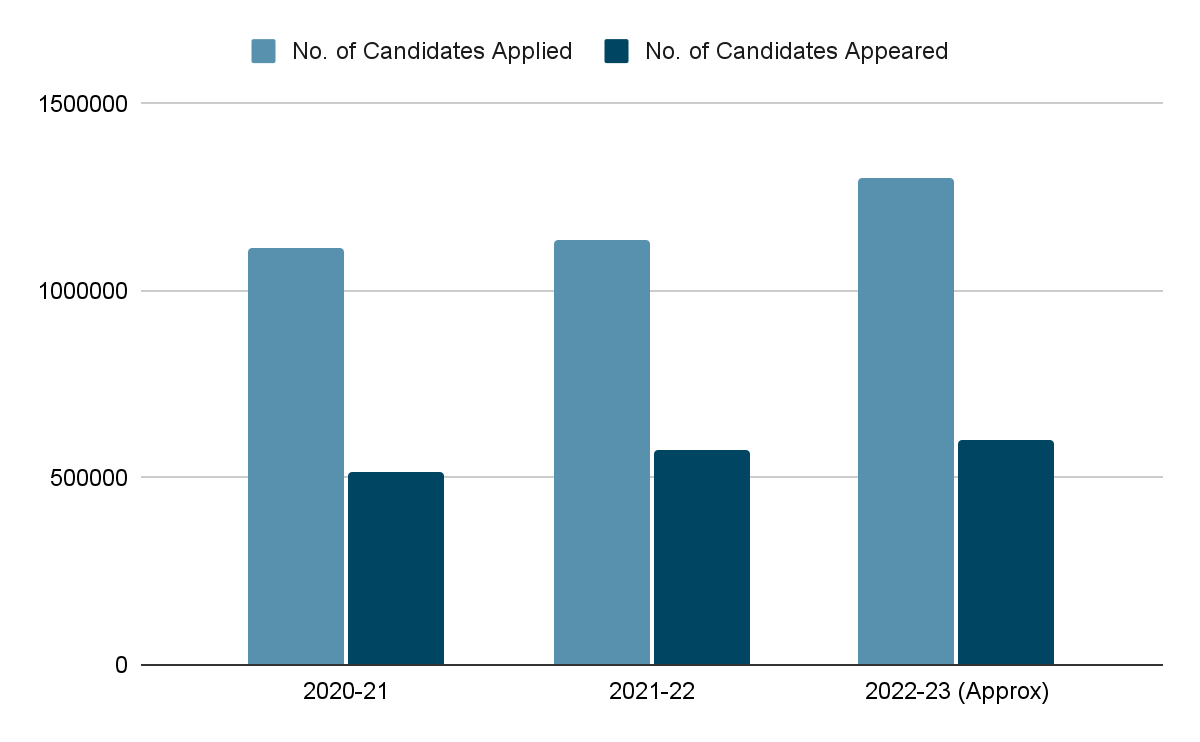UPSC CSE Statistics 2024 - How Many IAS Officers are Selected Every Year
UPSC IAS Statistics 2024 - UPSC CSE 2024 Statistics reveal that every year, approximately 1 million aspirants take their shot at the UPSC exam and only 0.2% candidates pass the exam. Even though the total number of vacancies is just around 1000 for all 24 services combined, UPSC CSE Statistics notes that the number of candidates who appear for the exam are ever increasing.
This Story also Contains
- UPSC CSE Statistics 2024
- UPSC CSE Exam Statistics 2007 to 2023
- UPSC CSE Exam Analysis

The Union Public Service Commission (UPSC) conducts Civil Services Exam (CSE) every year to recruit candidates for different posts in the Indian government including the prestigious posts of Indian Administrative Service (IAS), Indian Police Service (IPS) and Indian Foreign Service (IFS).
UPSC CSE Statistics 2024
An analysis of the previous year UPSC CSE statistics reveals a shift in trends after 2009 regarding the total number of applicants and success rates. The results are tabulated below to help predict the UPSC CSE Statistics 2024.
UPSC CSE Exam Statistics and shift in trends
Years | UPSC CSE Statistics |
UPSC CSE 2006 to 2009 | Total UPSC vacancies - 3157 (993 per year) Total applicants: 14.52 lakh students (on an average 3.63 lakhs per year) Qualifying students in UPSC Mains - 40,413 (on an average 10,103 per year) Only 7858 students qualified for interviews (on an average of 2435 per year) |
UPSC CSE 2020 to 2023 | Total vacancies: 3823 No of applicants for Prelims: Around 46.03 lakhs. Qualifying students in Mains - 48,214 students. Students who qualified for UPSC CSE interviews - 10,000 students. Number of students who qualified for an interview - 1204 |
Also read:
UPSC CSE Exam Statistics 2007 to 2023
The table below analyses the previous years UPSC CSE Statistics to get clarity on the number of candidates who applied for the exam, cleared prelims, cracked mains, attended the interviews and made the final cut. Analysing the previous year UPSC CSE Statistics also aids in predicting cut offs and getting an approximate on safe scores.
UPSC Civil Services Exam Statistics - 2007 to 2023
Year | Total No. of candidates who applied for the CSE exam | Total No. of candidates who appeared in the CSE prelims | Total No. of candidates who qualified for CSE mains | Total No. of candidates who appeared in the IAS mains exam | Total No. of candidates who appeared for the CSE interview | Total no. of candidates who got selected finally for the posts |
2023 | Around 13 Lakh | Around 6 Lakh | 14624 | - | 2916 | 1016 |
2022 | 11,35,697 | 5,73,735 | 13090 | - | 2526 | 933 |
2021 | 1112318 | 513192 | 9214 | - | 1823 | 761 |
2020 | 1056835 | 486952 | 10564 | - | 2049 | 833 |
2019 | 1154769 | 574980 | 11845 | - | 2034 | 829 |
2018 | 1065552 | 500484 | 10419 | 10246 | 1994 | 759 |
2017 | 969065 | 46284 | 13300 | 13060 | 2564 | 1056 |
2016 | 1128262 | 459659 | 15382 | 15149 | 2961 | 1099 |
2015 | 945908 | 465882 | 15008 | 15,008 | 2797 | 1078 |
2014 | 947428 | 446623 | 16706 | 16286 | 3308 | 1236 |
2013 | 776604 | 324279 | 14800 | 14178 | 3001 | 1122 |
2012 | 550080 | 271442 | 12795 | 12190 | 2674 | 998 |
2011 | 499120 | 243236 | 11837 | 11237 | 2415 | 999 |
2010 | 547698 | 269036 | 12271 | 11865 | 2589 | 965 |
2009 | 409110 | 193091 | 11894 | 11516 | 2431 | 989 |
2008 | 325433 | 167035 | 11669 | 11330 | 2136 | 881 |
2007 | 333680 | 161469 | 9158 | 8886 | 1883 | 734 |
UPSC CSE Trend Analysis 2021 to 2023

Also read:
UPSC CSE Exam Analysis
The UPSC CSE statistics given above makes it evident that the success rate of this competitive exam is less than 1% making the candidates feel like they don’t have a chance at cracking this exam. However this data can also be interpreted on a positive note.
Even though UPSC CSE Statistics reveal that every year a lot of candidates apply for the exam, only around 50% of candidates show up. The example of the year 2025 is a case in point with approximately 9,45,908 applicants for UPSC CSE exam but only 4,65,882 candidates actually showing up.
Even amongst this 4,65,882 applicants, a good majority only show up on the insistence of their parents or due to peer pressure and are not serious or dedicated towards cracking the exam. Considering this new approach at interpreting data, even though lakhs of candidates apply for the UPSC CSE exam, only a few thousands are serious about it.
Considering the 2024 statistics again, the final list of qualified candidates is 1078 and if according to the previous assumption, the number of serious candidates is around 45000, the success rate of the exam becomes 2% which is higher than its previous record of less than 1%.
On the basis of the Mains statistics, the number of candidates who qualify the Mains exam is approximately 14 times the number of openings which show that around 15008 candidates cleared the Prelims. Hence out of 62,000 candidates, 1 in 4 serious candidates crack the exam making the success rate of clearing Prelims 25%.
The competition for a spot under UPSC CSE is not with the 4,65,882 candidates who showed up but with these 62,000 candidates who are serious. Furthermore, out of the 15,008 candidates who qualify for Mains, 2797 candidates qualify for the final interview making the success rate approximately 15%. In the final personality test interview, one out of two candidates are selected making the success rate 50%.
Also read:
With this logical analysis in mind it becomes evident that it is possible to clear the UPSC CSE exam if the candidate is serious and has a solid UPSC IAS study plan crafted from a deep understanding of the syllabus and UPSC IAS previous year papers. Even though the table and numbers denote a success rate of less than 1%, the competition is never with the total number of candidates who apply for the exam.
The chance of clearing every competitive exam is half preparation and half mindset, so don't let the big terrifying numbers of UPSC CSE and UPSC IAS Statistics scare you and grind on with a positive attitude and a can-do spirit.
Frequently Asked Questions (FAQs)
There are approximately 1056 vacancies according to the official UPSC CSE notification.
Ideally students should spend around 12-15 hours daily on different topics to crack IAS.
Students can opt for history, geography, political science as their domains after 12th as these subjects make the base for UPSC Civil Services Exam.
As per the UPSC IAS statistics 2024, approximately 13 lakh candidate appear for the UPSC IAS exam.
The UPSC form 2024 was released on February 14, 2024.
Candidates must meet the age eligibility of 21 - 32 years for UPSC IAS 2024
According to the UPSC CSE statistics, the success rate of UPSC Prelims is just 25% so it is considered tough.
Questions related to UPSC CSE
On Question asked by student community
Hi Basar,
To get the fastest updates on upcoming government exam notifications and application dates, regularly check dedicated portals like Careers360. Click here for Upcoming Government Exams 2026: Latest Updates on UPSC, SSC, Bank, Railway, TET, Defence Exams
Hello,
After Class 10, it will take 2 years to complete Class 11 and 12, followed by 3 years of graduation, which is the minimum requirement for UPSC.
UPSC preparation and clearing the exam may take 1–2 years. After selection, IAS training takes about 2 years. Overall, it takes around
Hello Aspirant
As your question is not clear, you are asking how to become an IAS, which course or degree you should pursue, and all the related details regarding the IAS. So, I can suggest you choosing the right stream in Intermediate is important.
The Arts/Humanities stream is most helpful
Hello Aspirant
All colleges are the best, and selection mainly depends on you and your consistency. But I can help you regarding this :
After the 10th, you can join PU (11–12th) colleges that offer strong academics and an early IAS foundation.
Some good options are Delhi’s Rajendra Prasad Sarvodaya
Hello
If you want to become an IAS officer, you can choose any group CEC, MPC, or BiPC as IAS does not require a specific subject stream.
However, many students prefer CEC (Commerce, Economics, Civics) or MPC (Maths, Physics, Chemistry) because they help build analytical and general knowledge skills useful
Applications for Admissions are open.
Apply for Online M.Com from Manipal University
